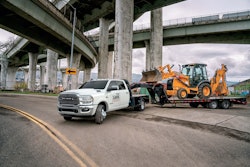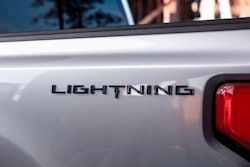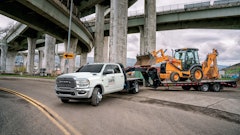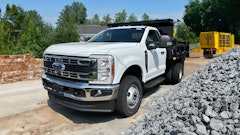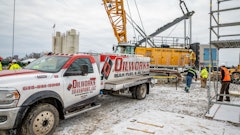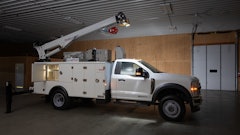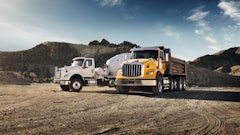
Trucks are constantly being used in the construction industry. Whether they are owned or rented, trucks are a very popular item to have for contractors and construction companies alike. While they haven’t been historically as popular, cargo vans can also be very useful in carrying supplies from site to site.
As your fleet begins to age and become more costly due to added maintenance, you may be considering replacing them with new vehicles — maybe even renting them at that. Before you immediately go for a new truck for your fleet, consider renting a van.
Vans are a great option for many reasons including security, addable shelving, and added space. When it comes to finding a place to rent a van, there are a lot of different choices and most will offer vans as a blank canvas - with nothing inside.
If you are considering renting vans but don’t want to go through the hassle of setting up and wrapping the van, there are some companies that do a lot of the setting up for you.
What Vans Have to Offer
Most construction companies have at least a truck or two in their fleet, but vans can be a good alternative. Vans are enclosed and offer more storage options than most trucks can. Cargo vans can be useful for any contractor. This includes contractors in fields such as:
- Construction
- Electrical
- Plumbing
- Solar installation
- Any field requiring equipment/tools/onsite personnel
If you are considering incorporating cargo vans into your fleet, there are many things that contractors should consider before simply going with what they know.
Chris Thomas, vice president of sales at Kingbee Vans, said, “Vans have significantly improved in the last five years, and today they are a completely viable option for fleets.”
With benefits that have improved over time, here are a few things to look forward to:
Space
While trucks provide a decent amount of space, vans have the capability to be fitted with specialty equipment. This entails things like racks, partitions, and shelving units. These specialty options allow for better organization, a potentially safer environment, and more space to store things.
Additional space can be especially useful for contractors that have a lot of tools and smaller pieces of equipment that they need to transport onsite with them.
Security
Using cargo vans in place of trucks can provide a safer, more enclosed area for your equipment to go.
”Cargo vans provide the security benefit of an enclosed storage space to minimize theft, especially if vehicles are left at the jobsite overnight,” said Thomas.
Rather than having your equipment and tools out in the exposed bed of a pickup truck, a van offers a contained area that can be locked to store your gear.
Branding
When you drive around your fleet vehicles, it is beneficial to have some sort of branding on the side. Whether it just be a logo or the name and contact information for your company, having a branded truck is an important advertising move.
With cargo vans, there is a lot more available space for your branded wrap to be placed if you so choose.
The Downside to Using Vans Instead of Trucks
While there is a lot to gain from using cargo vans, there are still some things you may miss out on when compared to trucks. A few of these downsides include:
- Less seating available
- Weaker towing abilities
- Fewer all-wheel drive and four-wheel drive options
Thomas explained, “Trucks are typically more associated with heavy-duty work, whereas vans are better utilized for most residential and commercial applications.”
Why Rent?
Renting some of your fleet can have many benefits depending on the needs of your company. Renting offers cost-effectiveness and flexibility, allowing companies and contractors to avoid committing to owning every machine. Renting can save money on maintenance and frequent replacement.
When renting, an important cost that the renter takes on is the fueling cost. In general, vans tend to get better mileage than trucks do, making them more appealing to the average contractor. Renting a van for your fleet can save you from things like depreciation.
“[One of] the most significant benefits to renting [is] being able to receive fleet vehicles quickly and on flexible terms,” said Thomas.
When you need a vehicle, it is quick and easy to rent one and requires far less rigid agreements or payment conditions. Renting a portion of your fleet allows you to effectively respond to changing market needs. Many contractors look for multipurpose vehicles for their fleets and this is a way of being flexible in a changing market. Contractors know that a job might need one type of equipment while another job needs an entirely different type. Renting vans is another way of being flexible. Having the ability to switch van sizes and capabilities is a great way to stay accommodating to each jobsite.
In addition, renting provides a valuable opportunity to experiment with new technology and assess its potential fit within your company. Renting a van when your fleet has never had a van gives you a chance to see how its benefits suit you.
Fluctuation and Expenses
Thomas explained that rentals don’t affect a company’s balance sheet since it isn’t considered a capital expense. Rentals are instead categorized as an operating expense and if your company is trying to raise its capital for other parts of its business, this is especially beneficial. But, scaling operations are not without risks and can come with uncertainty.
Thomas noted, “The ability to receive vehicles quickly without committing to long-term assets helps to mitigate some of that risk.”
Moreover, the construction industry is fluctuating all the time and the needs for different types of equipment and machines change with time. Renting is a great option when your jobs don’t always consist of the same needs.
“Additional vehicles are typically required to complete … jobs, and renting vans during those months can be extremely beneficial because contractors can receive new vans without spending the upfront capital required for purchasing new vehicles, and they can then return the rental vans when the project is completed,” said Thomas.
Thomas also shared that rental vans can be a good fit for contractors who want to adjust the size of their fleet depending on industry increases or decreases in demand.
Pack Up a Van
Rental cargo vans hold a lot of opportunity when it comes to security, cost-effectiveness, organization, and storage. When you’re considering renting and wondering if vans are the way to go for you, Thomas offered a few things to think about.
Thomas said, “Think about some of the issues [you] may be having with [your] current vehicles. Are they being broken into frequently? Is the cost beginning to get too high? Are you looking for more customizable options?”
If you find yourself agreeing and relating to the questions posed, rental vans might be your next venture. Thomas said that it can be easy for companies to get stuck in the way they’ve always done things but when you need vehicles for your fleet quickly, renting a van is the way to go.
If renting cargo vans is in your future and you don’t want to deal with the setup of shelving, partitions, and a customized wrap, companies like Kingbee Vans have various “upfitting” options that can ease you into the process.
Of course trucks and vans each have their own uses and one will never be able to entirely get rid of the other, but there are some situations where one vehicle’s benefits outweigh the other. The bottom line is that vans are starting to trend in the construction industry and renting one can be the easiest way to find out if they are right for you. Renting vans can be easy, convenient, a money saver, useful, and secure — and it may be the right move for you. Make sure you do your research and weigh your vehicle needs and cost interests, and maybe a rental van will be the next vehicle to join your fleet.





